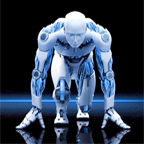Step aside “Terminator” — moviemakers looking to make accurate dystopian movies should instead take cues from “The Grapes of Wrath.”
That’s because robots won’t take our lives — they’re more likely to take our livelihoods.
And it’s looking more and more likely that these artificially intelligent programs will even take over the job of making themselves — some researchers think it’s likely that software engineers will one day be supplanted by intelligent software that can copy, write, and improve programs itself.
“I can envision systems that become better and better at writing software,” Bart Selman, a computer scientist at Cornell University, said. “A person complemented with an intelligent system can write maybe ten times as much code, maybe a hundred times as much code. The problem then becomes you need a hundred times fewer human programmers.”
An oft-cited 2013 Oxford study estimated that programmers and software engineers have just an 8% chance of automation in the next 20 years. Selman disagrees. He said that number will end up being much bigger, and we should be ready for it to skyrocket in the future.
Given time, some AI systems, especially those using a methodology called machine learning that allows AI to improve over time, will get better and faster than humans at writing software.
“[Software engineer] looks fairly safe right now,” Selman said. “But you know, 20 to 30 years from now that might be different.”
And of course software engineers aren’t the only jobs at risk. The Oxford study projected that47% of all employment in the US is likely to be automated by 2030.
But Toby Walsh, a professor in artificial intelligence at the National Information and Communications Technology Australia, told Tech Insider that eventually those numbers might be much worse.
“It’s hard to think of a job that a computer ultimately won’t be able to do as well if not better than we can do,” Walsh told Tech Insider.
Others have noted that many jobs in, for example, the legal field, could also be disappearing soon.
The idea that computer scientists and lawyers might lose their jobs to the products they built is jarring, but Selman said there’s no reason it wouldn’t happen once robotic labour becomes cheaper than human labour. That humans will always be smarter or more efficient than the AI systems they build is a misconception.
“Chess is actually a good example,” Selman said. “The programs are generally written by people who are fairly bad chess players. As a programmer, you can write a program that can do a task much better than you can.”
